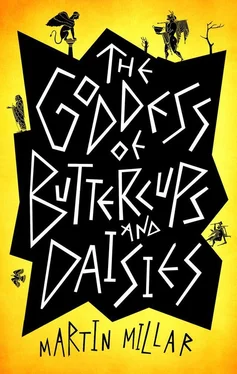In Peace , after Trygaeus flew to heaven on the giant dung beetle, he seized the chance to rescue the Goddess of Peace from a cave, where she’d been trapped by War. All the Athenians onstage at the time, represented by the eighteen-man chorus, were to pull her out of the cave at the end of a rope. At the theatre there was a mechanism for raising objects hidden beneath the stage so they appeared through the trapdoor. It was an impressive effect, if the company got it right. When the Goddess of Peace emerged through the trapdoor, freed by honest Athenians, Aristophanes was expecting it to create quite an impression. As he arrived at the stage, the chorus had finished their dialogue and were straining mightily on the rope. At least they were meant to be. Aristophanes wasn’t convinced there was a lot of straining going on.
‘Put some effort into it!’ he said. ‘Make the audience think you’re working!’
As the chorus weren’t professionals, but ordinary citizens recruited for the Dionysia, it made life a little harder for Aristophanes. He couldn’t yell at them in quite the way he’d have liked. They set to it well enough, however, and gave a reasonable impression of men straining to pull something heavy from the ground. The trapdoor opened. With a final, mighty effort, the chorus pulled the Goddess of Peace from the cave. Or at least they would have, if the Goddess of Peace was actually a shabby children’s doll, no more than ten inches tall.
Aristophanes stared at the pathetic little artefact.
‘Hermogenes, what is that?’
‘Our statue.’
‘But it’s a child’s doll.’
‘I know, but it’s all we’ve got.’
‘What do you mean “it’s all we’ve got”? You told me the statue-maker was sending over the real one today.’
Hermogenes shrugged. ‘He sent a note saying he wasn’t letting us have it till we paid him.’
‘This is no good! I can’t send my chorus onstage with a child’s doll for a statue! The audience will riot.’
Aristophanes’ head was pounding. ‘I feel dreadful. For a rich man, I’m not certain Callias serves good quality wine. What the Hades are we going to do about this statue?’
Hermogenes looked hopeless. ‘Can you pay the statue-maker?’
‘No.’
‘In that case, I don’t know.’
‘What sort of assistant are you? Find a solution!’
Hermogenes was too competent to be bullied. He stood his ground, informing Aristophanes that as writer and director, it was his responsibility to make sure the play was well enough funded by their producer. Aristophanes scowled at him. Hermogenes was right. The playwright felt like exploding in anger at everyone on stage, but realised there wasn’t any point. It wouldn’t help, and it would only make his hangover worse.
‘Well where are the beautiful maidens that are meant to accompany the statue?’ he growled.
Hermogenes pointed to two male actors, both in poor physical shape, wearing very unconvincing female costumes and masks.
Aristophanes shuddered. ‘Is everything in this production designed to humiliate me?’ He looked round for the junior assistant. ‘Didn’t I ask you to bring something for a hangover? Stop dawdling!’
He turned to Hermogenes. ‘We can’t put the play on like this. We’ll never get out of the theatre alive. You know what a drunken rabble that audience is. By the end of the festival all standards of decency will have disappeared. Have you ever been hit by an onion thrown from the back row where the sailors’ wives sit? I have. I don’t intend to let it happen again.’
‘Then you probably shouldn’t look at the latest phalluses,’ said Hermogenes. Aristophanes looked over to where two gloomy-faced actors were trying, unsuccessfully, to erect their fourteen-inch penises. There was something obscenely hopeless in the way they were working the drawstrings inside their tunics, to little effect. And not, reflected Aristophanes bitterly, obscenely hopeless in a funny way. He shuddered again. The junior assistant arrived back at a run, carrying a goblet.
‘Your hangover cure.’
‘Fine. Now bring me some wine, and make it quick.’
Hyperbolus met Euphranor before they entered the assembly. They talked quietly, standing a little aside from the mass of white-clad Athenians making their way inside. Some distance away, lines of Scythian archers were walking down the main streets carrying ropes daubed with red paint. It was a crime to miss the democratic assembly. All male citizens were obliged to attend. Anyone tardy enough to turn up with red paint on their tunic was liable to a fine.
‘Something went wrong,’ said Euphranor. ‘Aristophanes survived.’
‘Whose fault was that?’
‘The assassin’s, I suppose,’ said the weapon-maker.
‘Where did we hire him?’
‘Through the priestess Kleonike.’
Hyperbolus scowled; he looked fierce, with his shaggy black hair and beard. It was an expression he often wore while speaking at the assembly. ‘So we’re depending on a woman now?’
Euphranor mopped his brow. The heat was overpowering. ‘She’s done all right for us so far. The peace conference is falling apart.’
‘I suppose that’s true.’ Hyperbolus nodded. ‘Once I’ve spoken in the assembly today it’s going to fall apart a lot quicker. I’m going to accuse Nicias of taking bribes.’
‘Has he been?’
‘Who cares? Damned aristocrat, I’ll see him ostracised before I’m finished with him.’
They were interrupted by two citizens, both elderly, who wanted to thank Hyperbolus for the food he’d sent them. The democratic faction had been organising the collection and distribution of supplies for impoverished citizens, and the elderly pair were grateful for the help they’d received. Hyperbolus accepted their thanks politely, and wished them well as they made their way into the assembly.
The heat was oppressive, far too hot for April. No one could remember the temperature rising so sharply before. The mood was sombre, with undertones of anger. Everyone knew that their situation was becoming desperate, and the meeting was likely to be stormy. No one expected it to end in any sort of agreement. The atmosphere in Athens had worsened quite dramatically in the past few days. Nothing was going well, and nobody could agree on anything. None of those assembled expected today’s meeting to be any different to the last. Hyperbolus would hurl abuse at Nicias, accusing him of cowardice, corruption and selling out the city to the Spartans. Nicias would in turn lacerate Hyperbolus and his associates, till it seemed an absurd notion that the Athenians could ever sign a treaty with Sparta, when they themselves were so bitterly divided.
Bremusa had become used to the odd looks she received while walking round Athens. Although upper-class Athenian women tended to remain indoors, out of public view, there were plenty of women on the streets — vendors, tavern employees, dock workers, hetaerae, slaves and others. None looked like the Amazon. Her hair was longer, and she wore it loose and unstyled. She had dark leather armour and leggings. The leggings alone were enough to mark her out as a barbarian. No Athenian of either sex would ever wear trousers. They were the mark of the uncivilised.
After a few days, though, it did seem to Bremusa that she was receiving less attention. Perhaps people were becoming used to her. Or perhaps they had more pressing matters to worry about. The atmosphere of frustration and annoyance was tangible. It was more than just the despair caused by the never-ending war, and the failure to make progress in the negotiations. Something else was weighing Athens down. Bremusa knew that Laet’s baleful influence was permeating the city.
Читать дальше












